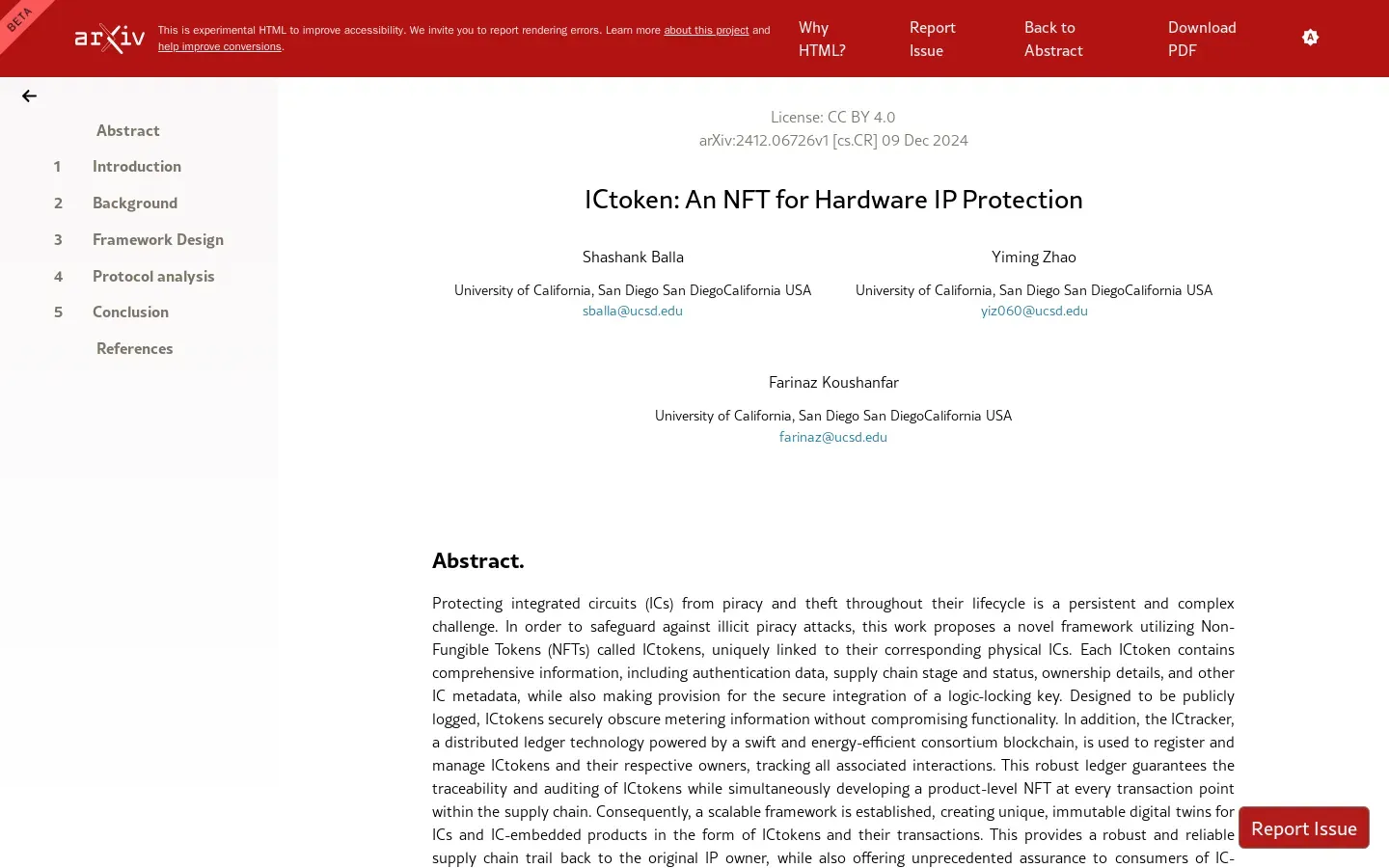
ICtoken Framework Enhances Integrated Circuit Security Through Blockchain
/ 4 min read
Quick take - Recent research has introduced the ICtoken framework, which utilizes blockchain technology to enhance the security and integrity of integrated circuits in the supply chain, addressing issues such as counterfeiting and unauthorized access while promoting transparency and compliance.
Fast Facts
- ICtoken Framework: Introduces decentralized ownership and transaction verification, enhancing security and privacy in integrated circuit management through blockchain integration.
- Active Metering and Logic Locking: Identified as effective strategies to protect integrated circuits from unauthorized use and reverse engineering, bolstering hardware resilience.
- Physical Unclonable Functions (PUFs): Highlighted as a key technology for safeguarding hardware intellectual property, especially when combined with blockchain solutions to prevent piracy.
- Supply Chain Transparency: Blockchain integration improves provenance and traceability, addressing counterfeit threats and fostering greater transparency in the supply chain.
- Future Directions: Emphasizes the need for lightweight ICtoken frameworks for IoT devices, machine learning for risk management, and collaboration with regulatory bodies to enhance compliance and consumer trust.
Advancements in Integrated Circuit Security Through Blockchain and ICtoken Framework
Recent research has unveiled significant advancements in the security and integrity of integrated circuits (ICs) within the global supply chain. This study focuses on the development of ICtokens and their associated technologies, highlighting the potential of blockchain integration and innovative methodologies to combat issues such as counterfeiting, unauthorized access, and supply chain vulnerabilities.
Overview of the Research
The primary objectives of this research include the development of ICtokens, a secure information transfer system, and a proof-of-concept implementation aimed at enhancing the management of intellectual property in the integrated circuit supply chain. Key methodologies employed in the study encompass the design and structuring of ICtokens, blockchain-based ICtracker implementation, and transaction protocols for lifecycle management.
Key Findings and Technological Innovations
ICtoken Framework
The introduction of the ICtoken framework is pivotal in establishing decentralized ownership and transaction verification. By integrating blockchain technology, this framework enhances security through privacy-preserving data management, thereby reinforcing consumer trust and awareness.
Active Metering and Logic Locking
The research identified active metering and logic locking as effective strategies for safeguarding ICs against unauthorized use and reverse engineering. These techniques enhance hardware resilience against potential security threats.
Physical Unclonable Functions (PUFs)
PUFs were emphasized as a critical technology for protecting hardware intellectual property. By integrating PUFs with blockchain solutions, the research demonstrates a promising approach to securing hardware designs from piracy and unauthorized replication.
Supply Chain Transparency and Compliance
Blockchain technology integration has the potential to improve provenance and traceability within supply chains. This capability addresses significant threats such as counterfeit components and untrusted foundries, ultimately fostering greater transparency.
Strengths and Limitations
The strengths of the research lie in its comprehensive approach to enhancing supply chain security through advanced technologies. The implementation of smart contracts, cryptographic hashing, and Merkle trees strengthens the integrity and security of the ICtoken framework. However, limitations exist, including the need for further investigation into lightweight versions of the ICtoken framework for resource-constrained IoT devices. Additionally, exploring machine learning algorithms for predictive risk management in supply chains remains an area for future exploration.
Future Directions
Integration with IoT Devices
Future developments could focus on creating efficient ICtoken frameworks tailored for IoT devices to ensure that security measures do not hinder performance.
Supply Chain Risk Management
There is potential for incorporating machine learning to enhance transaction data analysis, allowing for proactive measures against disruptions in the supply chain.
Collaboration with Regulatory Bodies
The findings encourage collaboration with regulatory entities to ensure compliance and bolster consumer trust through enhanced auditing processes.
Implications for Cybersecurity
The implications of this research extend beyond theoretical advancements, with practical applications poised to revolutionize the management and security of integrated circuits. By leveraging blockchain technology, the research paves the way for enhanced access control, improved data privacy, and effective mitigation of supply chain threats. This ultimately contributes to a more secure and transparent electronic ecosystem.
In conclusion, the ICtoken framework and its associated methodologies represent a significant step forward in addressing critical challenges faced by the integrated circuit supply chain. These advancements set the stage for a more secure and resilient future in hardware security.



